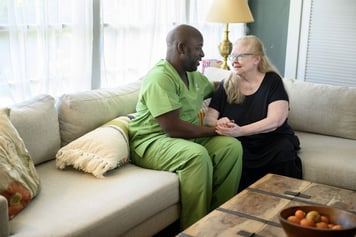Knowing when to call hospice can be a difficult question to answer. If you or a loved one are struggling with decisions about end-of-life care, have heard about hospice services and think it may be time to start the conversation about it, there are some important considerations that can help you understand what to do.
According to the National Hospice and Palliative Care Organization (NHPCO), the average length of stay for Medicare recipients enrolled in hospice was just 92.1 days in 2021. That’s despite the fact that a patient can be eligible for hospice care once their terminal illness gives them six months or less to live. That means that many people living with terminal illness miss out on the benefits of hospice care.
What Are the Signs I Should Call Hospice?
Hospice care is not just for the last few days or weeks of life. Often, there are signs and symptoms that indicate it may be time to consider hospice months before the end of a person’s life. There are also some signs that death may be very close.
[action 1]
Early signs it’s time to call hospice
For anyone who has been diagnosed with a terminal illness, there are some key signs that may appear in the weeks to months prior to dying that signal it’s time to call hospice. These include:
- Decreased appetite
- Weight loss
- Increased sleepiness
- Increased pain and nausea
- Decreased desire for socialization and interaction
- Increased infections
Later signs it’s time to call hospice
As symptoms and disease complications progress, there may be more direct clues that a person’s quality of life is decreasing and that it’s time to call hospice. These include:
- Delayed responsiveness to surroundings and people
- Noticeable change in physical appearance
- Increased restlessness and confusion
- Even greater increase in sleeping
- Decreased food intake to the point of not eating
- Difficulty speaking or moving
Whether a person is in the early stages of their end-of-life needs or late in the process, it’s never a bad choice to call hospice and discuss possible benefits of care. Hospice staff are skilled in helping people understand their options and weigh the best approach to care. They have skills and assessments available like the FAST 7 scale specifically for Alzheimer’s patients and more, which help guide them in figuring out what stage of the dying process a person may be experiencing and whether they meet criteria for hospice care based on their current symptoms and level of functioning.
As these signs worsen, it can lead to a medical crisis as the final stages of dying begin. For those who do not have a plan in place or who have not started hospice care, this often means a trip — or many trips — to the hospital as families search for answers and symptom relief. The goal of calling hospice early in the dying process is to help support you through this journey so you can make the best choices for the care you want as soon as possible.
Why do people wait to call hospice?
You may be wondering why so many people who are eligible for hospice still wait until the final stages of life to call hospice. There are many reasons people may believe it is not time to call hospice:
- They aren’t familiar with hospice and don’t know they can call
- There is a misconception that hospice means a person is “giving up” or will die sooner
- Their culture avoids discussions about death
- They think hospice is a place and want to stay at home
- They think hospice is only for the last few days of life
- They’ve heard that hospice is just for cancer patients
- Their doctor hasn’t told them about hospice, despite them having a terminal illness
These are all common misconceptions about hospice. It is not a place — it is a service and can be delivered wherever a patient calls home. It is for anyone with a terminal diagnosis, and many physicians are not familiar with hospice and may not discuss it with their patients.
What are the benefits of calling hospice sooner?
People who call hospice earlier often find they have better quality of life. It’s not uncommon to hear patients who have chosen hospice state they wish they had known about the positives of hospice care sooner. These include:
- Improved physical, emotional and spiritual comfort
- Caregiver support
- Help in choosing goals for care
- 24/7 support for urgent needs
- Decreased hospital visits and more time spent at home
If you choose hospice services, your needs will be addressed appropriately within four levels of hospice care: routine home care, respite care, continuous home care and general inpatient care, depending on your needs and physician’s orders.
Can I change my mind after I call hospice?
If you’ve noticed any of the signs or symptoms listed above and think it may be time to call hospice, what if you change your mind later? The great news is that you can change your mind anytime about hospice care. This even includes after you have begun hospice services.
People may choose to leave hospice, for example, to pursue new curative treatments or because their circumstances change and they no longer need hospice support. It’s also possible that you may remain eligible for hospice beyond six months if your doctor certifies you are still terminally ill, so you can rest easy knowing that calling for early signs won’t prevent you from receiving the care you need. Your provider will work with you to help ensure your plan of care is appropriate.
After you have spoken with a hospice service about beginning care, it is also possible that they may recommend that palliative care is a better option for you or your loved one at this time. Because hospice care is only for those who have decided to stop curative treatment for their illness, palliative care may be a better choice for someone who needs chronic disease management and symptom relief but still plans to continue curative care.
What are some reasons to wait to call hospice?
As previously mentioned, it’s important to understand that someone is not eligible for hospice care if they are still receiving curative treatment for their diagnosis or are expected to live more than six months. A physician must certify that if the disease takes its normal course the person has six months or less to live for hospice services to begin.
If you are in doubt, a hospice care coordinator can walk you through your individual situation and help you make the best choice for you.
I called hospice, now what happens?
If you and your healthcare team decide that hospice is the best choice for you, an interdisciplinary team of providers will help you plan your care going forward. While enrolled in hospice care, you will receive regular visits from hospice staff and have access to caregiver support, spiritual counseling, medical and nursing care, pain and symptom management, supplies needed for hospice care, bereavement support and more.
If you still aren’t sure it’s time to call hospice
Taking the step of calling hospice can feel overwhelming. If you still aren’t sure it’s time to call, you can take our quiz to help you decide if it’s the right choice, or talk with your provider and ask for their recommendations. The good news is that help is readily available when you make the call.





